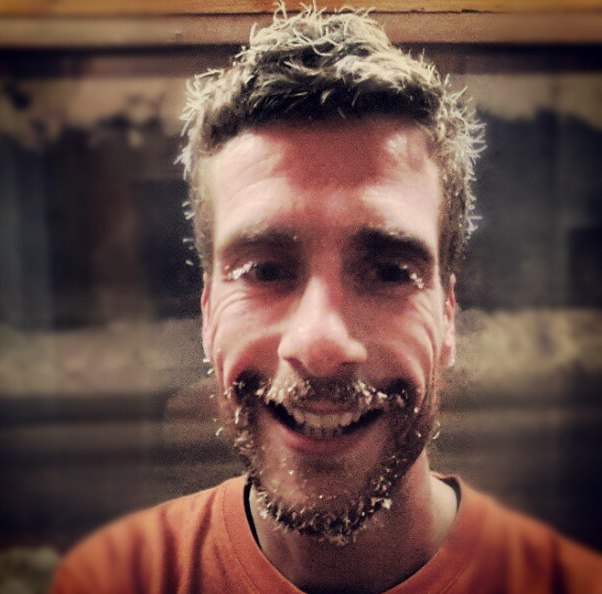
If you want the tl;dr version, just go here and give a good cause some money.
What do we do when someone dies?
We have a way of marking these things. Of dealing with them. When everything else is stripped away by choking grief, there’s the rung of a ladder, a structure to cling to a process we set up, follow through. Tell people, cry, arrange the funeral, forget they’re gone, remember, cry, register the death, remember something funny they once did, laugh, cry, stand around with other people who loved them, friends, relatives, raise glasses, wrap words around yourselves, and whisky, eat stupid triangular sandwiches and work out what exactly is encompassed by notions such as ‘goodbye’ or ‘forever’, cry.
My friend John died two weeks ago on Saturday. I didn’t know for a couple of days. The brilliant Rachael called me the following Tuesday. It was going to be in the papers. She didn’t want me to find out that way.
My friend John, who was 34, died in a snowboarding accident in Chamonix, where he’d been almost all the winter season, the day before he was due to come back. “Don’t google the reports. Or if you do, be prepared” Rachael said. Of course I did. It didn’t help. I couldn’t not.
I met John online, on Twitter, in the early days of Twitter when there was a degree of intimacy. When you made friends in that novel manner of being united by interest, wit, generosity. I knew John in this way almost 4 years.
A year an a half ago several difficult things happened to John in quick succession. Including being diagnosed with MS. I didn’t know this until one day on Twitter I spotted he was struggling with something. I dm’d my phone number, in a way a stranger had done for me a few months before when I was suffering a tough breakup, and invited him to call me if he wanted to talk to a friendly stranger. He replied that he considered me a ‘friend’, not a stranger.
We kept in touch over email. We found in common an interest in sports – me swimming and running, him running, snowboarding, surfing, and proper weight training in the gym. We both joined Fitocracy at a similar time, and through friendly competition drove one another to level up pretty swiftly. (I won through the unfair high marks they seem to award strong swimming versus strong running)
We also pushed one another in real life – one training weekend John came bearing my favourite whisky, and we swam 5000m (he did a little less) and ran half a marathon (he did a little more – running up and down as I just ran). He listened to me as I worried about money, he spoke about the changes he was making to live every inch of his life since the MS diagnosis. When I was tidying the spare room after he went home I found £100 wrapped up in a note. He refused to let me return it.
John emailed me a couple of weeks ago when I signed up to the marathon with a brilliant, detailed training regime. I even started following bits of it.
And now he’s gone. A brilliant, generous, kind and tough man.
When someone dies, in real life, we have a way of marking these things. A funeral, cards, flowers, getting drunk with friends and family, tears, groans, laughter, silence. Online, though, what are they here?
Because John’s still there. His social media profiles, dotting the landscape, slowly turning into archives. His last tweet. An instagram of the snow falling, his brilliant frosty face grinning after a run through the mountains of Chamonix. The driving test certificate he only got a year ago marked “for adventures, not commuting”.
We were going to go swimming in the North Sea when I was in Edinburgh in August. He was going to show me where to run. He was going to come see me tell a story about politics, family, and bravery, we were going to drink proper whisky.
My friend John died almost two weeks ago. He fell a long way. 3600ft the papers say. I think he would have laughed at my instinctive response to that; I did the math. I googled it.
He was falling for 20 seconds.
That made me feel better. Worse for being the kind of prick who does that, but better, because if Super Hexagon taught me anything, if swimming medals I’ve won in the past have taught me anything, it’s how long 20 seconds is. And that with every ounce of my heart and my head I hope it’s enough time to stop being scared, and absorb every last sensation, see every beautiful, perfect memory, wrapped in whiteness.
Those newspaper articles won’t be the last thing written about John online. This will come after them. This is how he will be remembered by me. This is me marking his passing, in the brilliant, terrible, complicated space I met him.
And so, too, will I be running my first marathon for him. On Sunday the 7th of July. In Coniston. He was an active, extremely sporty person as I knew him. The prospect of MS was an incredibly difficult thing for him to deal with. I remember him saying Young MS Sufferers groups were really helping him. So I’ll be running to raise money for the Multiple Sclerosis Society. Click through to the Justgiving page. Please donate. Anything you can.
26.2 miles through the Lake District. Not just a marathon. One with hills. And dirt. And mud. Run by a swimmer from the flatlands of Lincolnshire. Bring it.
He would have been proud. Then he would have said ‘next time, faster’, and showed me how.
I miss you, John.
